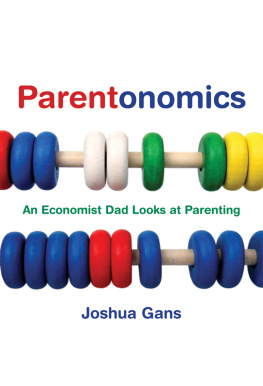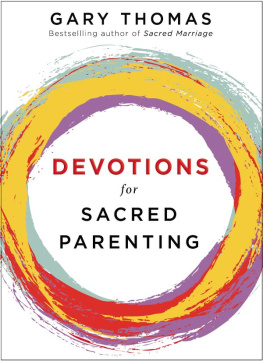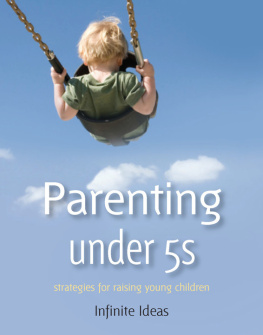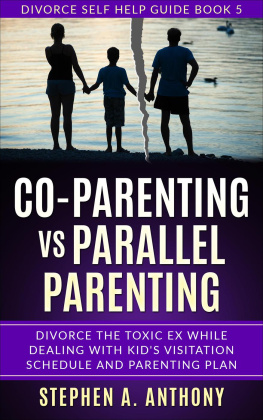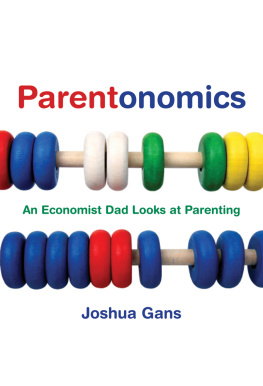Gans - Parentonomics: an economist dad looks at parenting
Here you can read online Gans - Parentonomics: an economist dad looks at parenting full text of the book (entire story) in english for free. Download pdf and epub, get meaning, cover and reviews about this ebook. City: Cambridge, year: 2009, publisher: The MIT Press;Mitt, genre: Children. Description of the work, (preface) as well as reviews are available. Best literature library LitArk.com created for fans of good reading and offers a wide selection of genres:
Romance novel
Science fiction
Adventure
Detective
Science
History
Home and family
Prose
Art
Politics
Computer
Non-fiction
Religion
Business
Children
Humor
Choose a favorite category and find really read worthwhile books. Enjoy immersion in the world of imagination, feel the emotions of the characters or learn something new for yourself, make an fascinating discovery.
Parentonomics: an economist dad looks at parenting: summary, description and annotation
We offer to read an annotation, description, summary or preface (depends on what the author of the book "Parentonomics: an economist dad looks at parenting" wrote himself). If you haven't found the necessary information about the book — write in the comments, we will try to find it.
What every parent needs to know about negotiating, incentives, outsourcing, and other strategies to solve the economic management problem that is parenting.
Gans: author's other books
Who wrote Parentonomics: an economist dad looks at parenting? Find out the surname, the name of the author of the book and a list of all author's works by series.
Parentonomics: an economist dad looks at parenting — read online for free the complete book (whole text) full work
Below is the text of the book, divided by pages. System saving the place of the last page read, allows you to conveniently read the book "Parentonomics: an economist dad looks at parenting" online for free, without having to search again every time where you left off. Put a bookmark, and you can go to the page where you finished reading at any time.
Font size:
Interval:
Bookmark:
Parentonomics
Parentonomics
An Economist Dad Looks at Parenting
Joshua Gans
The MIT Press
Cambridge, Massachusetts
London, England
Joshua Gans 2008
2009 Massachusetts Institute of Technology
All rights reserved. No part of this book may be reproduced in any form by any electronic or mechanical means (including photocopying, recording, or information storage and retrieval) without permission in writing from the publisher.
MIT Press books may be purchased at special quantity discounts for business or sales promotional use. For information, please e-mail or write to Special Sales Department, The MIT Press, 55 Hayward Street, Cambridge, MA 02142.
This book was set in Sabon and Helvetica round by SNP Best-setTypesetter Ltd., Hong Kong.
Printed and bound in the United States of America.
Library of Congress Cataloging-in-Publication Data
Gans, Joshua, 1968
Parentonomics : an economist dad looks at parenting / Joshua Gans.
p. cm.
Includes bibliographical references and index.
ISBN 978-0-262-01278-2 (hardcover : alk. paper)
1. Parenting. 2. Child rearingEconomic aspects.3. Responsibility in children. I. Title.
HQ769.G257 2009
332.024'0085dc22
2008032752
10 9 8 7 6 5 4 3 2 1
Published for sale in Australia and New Zealand by University of New South Wales Press Ltd.
To N, B, A, and the other A.
They are this book.
Preface
One of the most challenging parts of lecturing in economics is making it relevant for students. My strategy has been to liberally use examples from popular culture to bring ideas into the classroom. Thinking about how Monica and Rachel from Friends could divide up household chores, what sustained the reputation of the Dread Pirate Roberts in The Princess Bride, and the protocols for haggling in The Life of Brian could easily fill up an undergraduate classroom. But when it came to teaching MBAs, there was a new challenge. Their ages and age range made it hard to find the salient pop culture references. And their craving for relevance to their own careers and decisions drove everything. Sure, I could find examples from businessbut usually they were so bound up with complexity and context that it was hard to make them hit home in one crisp, clear blow.
Then, in 1998, we had our first child. All of a sudden our everyday life became one big economic management problem. Not every parent sees it this way, but every parent faces the same issues. Among the more mature students in my classroom there was both empathy and common ground. And so, slowly at first, as I gathered my own experiences, I began using parenting examples to illustrate economic points.
A lot of my classes involved predicting what might happen if you introduce change when two or more people interact with one another; something that happens in markets and inside firms every day. One such situation is where a persontermed, in economics, the principalis trying to get anotherthe agentto do something they ordinarily would not want to do; like an employer trying to get an employee to work hard. Suffice it to say, this situation alone describes the life of a parent. You, the principal, try to get your child, the agent, to do various things, from sleeping, eating, toileting, and behaving to refraining from lying, cheating, stealing, and the use of violence on others. The question was whether economicswhich worries a lot about incentivescould be of any use to parentswho also worry a lot about incentives.
It is perhaps a misconception among noneconomists that economists are unduly enamored by incentives and what they might do for the world. Indeed, nothing could be further from the truth. Yes, it is true that incentives appropriately applied, in an appropriate situation, can generate some good outcomes. But, more often than not, putting incentives in place is risky. Much can go wrong. For instance, if you make an employee's pay depend upon their sales outcomes, you can find yourself losing those employees in recessions or end up having to pay them more, on average, to compensate. Or, if you give an employee a bonus for outperforming their sales numbers this year compared with last year, don't be surprised if they shift their numbers and maybe client deliveries around to make sure there is always growth.
As I tried to illustrate the ways that incentives could go wrong, my own parenting experiences increasingly came to the fore. And while it was not all I talked about, it is what students appeared to remember. When I saw them years later, they would recount back to me the story of how my daughter, who was allowed a treat if she successfully went to the toilet, would sit there until something came out. They would tell me that it actually changed the way they approached a contract negotiation or a personnel management issue. It wasn't that they were treating the other side like children, just that the story had made the economic message stick.
And they were not the only ones. My colleagues, in particular, seemed to enjoy the economic content in my own parenting dilemmas. They weren't learning from it as much as laughing at my struggles, feeling empathy, or using it as an opportunity to amuse themselves about how economists survive in the real world. A fellow economist and good friend, Catherine de Fontenay, urged me to start writing this stuff down. It took a while, but I finally accepted that advice and started a blog. As a new year's resolution to write about economics and parenting, I wrote one long post on January 2, 2003. However, as is the nature of these things, there it remained until 2006 when I took up blogging in earnest and rediscovered it. A few months later, it seemed that there might be enough material for a book. Those who had initially urged me to write, now urged me to reach beyond the blog. And so Parentonomics was born.
Nonetheless, a few disclaimers are in order. In my day job, I'm an economics professor. That means a few things. One is that I generally write about things that I have researched and can claim some expertise about. This book, however, is far from scholarly. While I can claim expertise in the economics you will read about in the ensuing pages, the parenting is another matter.
I have never researched parenting science and child behavior beyond my reading as a layperson. There is a lot of research out there in psychology and related disciplines, but it is beyond my expertise to digest it and offer authoritative commentary on it. Many of the ideas I put forward here may not be original, so I don't want to claim them as such.
What's more, my parenting experience could hardly be claimed to be the norm. I have three children, and so the experiences I recount here are based at best on that sample of three. This is not the sort of experience you would use to tell you something about averages or anything scientific.
Instead, my goals are much more limited. This book continues my mission to educate the world about economics and what it can do. I will illustrate various economic concepts, but only as they relate to parenting issues. This means that my coverage of economics will be haphazard and incomplete. Despite this, my modest hope is that in reading this book, you will learn a bit more about economics and economistsand about their limitations. I'd like to think that my own trials might even entertain you along the way.
I want to be able to look back upon this book as a record of what I was thinking during a particularly important period of my life. It is very personal. As you read it, you'll learn a lot about my children and my spouse, and about me. Occasionally, you will learn about my friends, and some others who have put their stories in the public domain. You'll find that I have a distinctively economic perspective on things, and you might find that somewhat stark.
Next pageFont size:
Interval:
Bookmark:
Similar books «Parentonomics: an economist dad looks at parenting»
Look at similar books to Parentonomics: an economist dad looks at parenting. We have selected literature similar in name and meaning in the hope of providing readers with more options to find new, interesting, not yet read works.
Discussion, reviews of the book Parentonomics: an economist dad looks at parenting and just readers' own opinions. Leave your comments, write what you think about the work, its meaning or the main characters. Specify what exactly you liked and what you didn't like, and why you think so.

